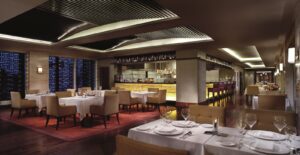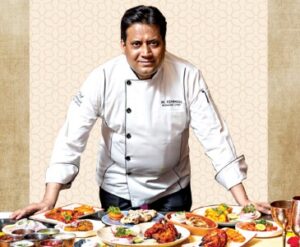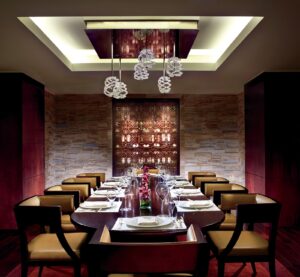In the runup to the festival of Holi, The Ritz-Carlton, Bangalore invited Chef Rahman from Lucknow, who specializes in Rampuri cuisine, to curate and recreate the richness of Rampur’s Royal Kitchen at its award-winning Northwest Frontier cuisine restaurant, Riwaz.

Riwaz at The Ritz-Carlton, Bangalore
The kitchens of the erstwhile Nawabs of the Rampur princely state were known to employ 100 chefs and sous chefs, refining the cuisine of the Pathans from Afghanistan carefully. The proof is an exhaustive cookbook in Persian that catalogues hundreds of recipes, that is still housed in the Rampur Raza Library. There is always some confusion about Awadhi cuisine and that of Rampur, both being in about the same region. We asked Chef Rehman.
Is Rampuri cuisine the same as Awadhi?

Chef Rahman
Chef Rahman – Originating from the same culinary landscape of North India, Awadhi and Rampuri cuisines each have their distinct flavors and culinary heritage. Awadhi cuisine, which hails from the renowned region of Awadh, is characterized by its intricate preparation techniques and the use of aromatic spices. On the other hand, Rampuri cuisine, originating from the princely state of Rampur, is known for its opulent and regal flavors, reflecting the royal heritage of the region. Despite their shared Mughal and Nawabi influences, both cuisines offer a delightful array of tastes, textures, and traditions, which can be savored at the Royal Kitchen of Rampur in Riwaz, The Ritz-Carlton, Bangalore.
How are the two cuisines of Rampur and Awadh different?
Rampuri cuisine distinguishes itself from Awadhi culinary traditions through its bold flavors and robust use of spices, such as onions, tomatoes, and garlic. Notable dishes like Taar Korma and Chungezi Murgh exemplify Rampuri cuisine’s affinity for vibrant tastes and rich gravies, often featuring ingredients like melon seeds, groundnuts, and aromatic spices like star anise, nutmeg, and mace. In contrast to the traditional Awadhi biryani preparation, where rice and meat are cooked separately before being combined, Rampuri biryani takes a unique approach by cooking the meat first and adding raw rice midway through the process before simmering to perfection. This distinct cooking method, coupled with the careful selection and blend of spices, highlights the nuanced flavors and culinary heritage of Rampuri cuisine.
What innovations have you added to the dishes on this menu?
I have devoted considerable effort to refining Rampuri cuisine by introducing a range of vegetarian dishes to cater to evolving tastes and preferences. By reducing the richness and oil content in traditional recipes, I’ve addressed health-conscious concerns while preserving authentic flavors. Furthermore, I have adjusted the meat ratio in dishes to accommodate preferences for lighter fare. Previously, the flavors of yakhni and meat dominated, but now, I have diversified our menu with a variety of vegetarian options such as Heeng Matar Ke Tikki, Khubani Ke Tikka, and Nawabi Baigan Bharta, ensuring there are appealing choices for every diner, whether they prefer vegetarian or non-vegetarian fare. These innovations were showcased in the menu available at The Ritz-Carlton, Bangalore from 15th March to 24th March.

Private Dining Space at Riwaz at The Ritz-Carlton, Bangalore

The Ritz-Carlton,Bangalore
The menu also featured tantalizing signature delicacies like Rajma Akhrooti Ke Kebab, Paneer Anjeer Pasanda, Murgh Pista Korma, and Nawabi Subzyat Biryani. And savory selections like Mughlai Khameeri Roti, wrapping it all up with scrumptious desserts like Khubani Ka Halwa and Eid Ke Sewiyan.
For those who missed it, wait until next time. Or visit Riwaz.
